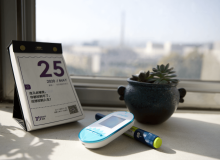Many patients think that when they go to the hospital to measure fasting blood sugar, they can get accurate fasting blood sugar values by not eating in the morning or taking anti-diabetic drugs. In fact, even if you do this, the fasting blood sugar value measured after 8 o'clock will be biased.
Causes of blood sugar errors
Most patients go to the hospital to have their blood sugar tested after 8:00, or even wait until 9:00 to 10:00, so they can do the blood sugar test on an empty stomach. However, the so-called "fasting blood sugar" is not the same as the fasting blood sugar in normal life. It cannot reflect the patient's true blood sugar status and loses the significance of measuring blood sugar before breakfast.
For many patients, going to the hospital to check their blood sugar once in a while only reflects the blood sugar situation at that time, and other blood sugar conditions are unknown. The best way is to have a blood glucose meter yourself and conduct regular monitoring with a home blood glucose meter so that you can know the true situation of your blood sugar level at any time. If the monitoring data can be recorded regularly, it will help the doctor adjust the treatment plan suitable for you.
How to measure accurate blood sugar level
Preparations for the day before. Generally speaking, patients should take hypoglycemic drugs as usual the night before, but they should avoid eating too much or over-dieting in order to obtain ideal results. They should not eat or drink water after 24:00. At the same time, ensure adequate sleep to prevent blood sugar fluctuations caused by lack of sleep.
Precautions before blood collection. Some patients walk or run in a hurry on the way to the hospital, and then measure venous blood and finger blood when they arrive at the hospital. The results of this measurement are often biased, and they should rest for a period of time after exercise before taking the measurement. In addition, you should keep your mood stable before blood collection, and ensure that the measurement is taken between 8 and 10 hours on an empty stomach. Patients should regard the blood sugar measured between 6:00 and 7:00 in the morning as "pre-breakfast blood sugar", that is, fasting blood sugar. Therefore, patients who measure "fasting blood glucose" must have a sense of time.
Work after blood collection. Since patients who are testing fasting blood sugar have not eaten breakfast, they are prone to symptoms of hypoglycemia after blood collection. This requires preparing some sugar cubes or sugar water in advance and replenishing it in time after blood collection.
How should different patients measure fasting blood glucose levels?
1. If the patient is unable to determine the specific time to measure fasting blood glucose in the hospital, he or she may have a normal meal at home in the morning and then go to the hospital to measure blood glucose 2 hours after the meal. This will not affect normal meals and medication, nor cause blood sugar fluctuations. More and more evidence shows that monitoring postprandial blood sugar not only helps to detect diabetes early, but also can better reflect whether the amount of meals and medication are appropriate, which cannot be replaced by measuring fasting blood sugar.
2. For patients who inject premixed insulin before breakfast and dinner, if treatment is delayed due to blood tests at the hospital in the morning, random blood sugar can be checked after the blood test. If blood sugar is high, a temporary injection of short-acting insulin can be given, followed by a meal. In this way, the increase in blood sugar caused by treatment delay can be eliminated to a certain extent, and at the same time, the occurrence of hypoglycemia caused by two "premixed insulin" injections in the morning and evening on the day of the examination that are too close together can be eliminated.
3. For patients treated with oral hypoglycemic drugs, if the blood collection time is too late when testing fasting blood sugar and the morning and noon medication times are too close, the dose at noon should be reduced as appropriate to avoid superimposition of the drug effects of the two meals. Hypoglycemia.
4. For patients who inject intermediate-acting insulin before going to bed, the hypoglycemic effect can be maintained until 8:00 to 9:00 the next day. Therefore, the blood collection time for fasting blood glucose testing in such patients is allowed to be later.

